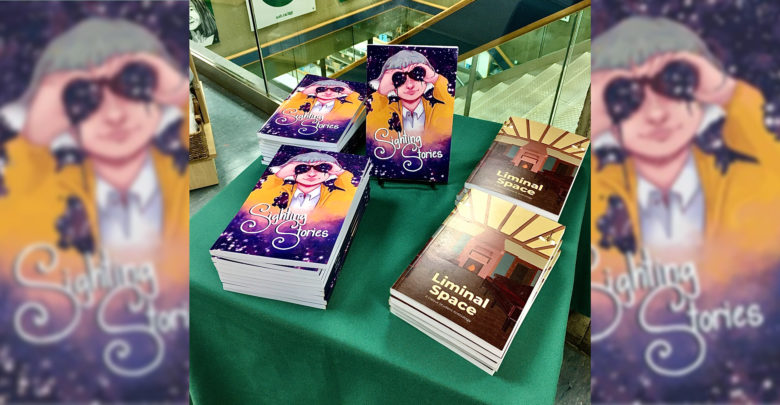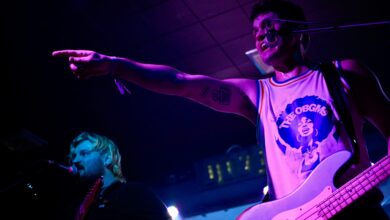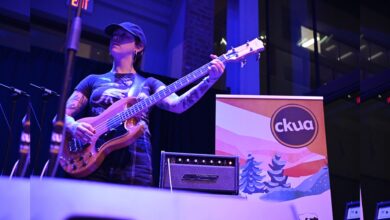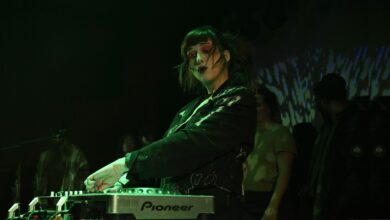‘Sighting Stories’ highlights creative writing by U of A students and alumni
In Sighting Stories, the anthology presents over 20 pieces of written work including poetry, fiction, flash fiction, and creative nonfiction.
 Bree Meiklejohn and Cassandra Williamson
Bree Meiklejohn and Cassandra WilliamsonStudents at the University of Alberta come from and continue to experience all walks of life. Sighting Stories is a creative anthology that creates space for their voices.
Written and put together by students and alumni, Sighting Stories is the Creative Writing Club’s (CrW) second anthology. The club has previously published Liminal Space, their debut anthology. The CrW’s anthologies include a wide range of genres including poetry, fiction, flash fiction, and creative nonfiction — all written and edited by students and alumni.
Sighting Stories highlights individual experiences
Hancheng Wu, one of the anthology’s contributors, spoke about how his personal experiences affected his piece. Wu’s fictional story follows a man who unroots his life to move elsewhere in order to pursue a dream, only to find that those aspirations come at a cost. Wu related his story to his experiences in computer science — connecting the character’s ambition and drive to those expected within the program.
“A lot of people say to write what you know,” Wu says. “What I think a lot of people don’t tell you about ambition is that there’s a steep price sometimes in terms of what you have to give up to pursue it.”
“I think looking back, I’m not as sure if the price of these ambitions [was] worth what I have received in the end.”
Wu also spoke about his admiration for novelist George R.R. Martin. He recalls that Martin once spoke about writer William Faulkner, quoting, “The only thing worth writing about is the human heart in conflict with itself.”
For Wu, his resonation with Faulkner’s words meant that the core of what he wrote, no matter the setting or the specific characters, was centred around emotional insights.
“I was able to sort of let myself bleed onto the paper and that was where this story came from,” Wu explains.
“I feel that I personally write best when I’m on a walk, or [being] outside of writing. Ironically, that’s where I do my best writing — where I’m not writing. It’s more of a subconscious kind of thing; it brews in the back of my mind.”
Being published while in university is no small feat. Wu describes his experience working with the CrW and his editors as “a really big help to [his] writing skills.” The process of writing, editing, and repeating that cycle until a piece is publication-ready was what Wu thought was most informative during his publication process.
“I think the experience of being published while we’re still in university and having our work sort of be ‘out there’ is super cool, super fascinating,” he says.
Getting published should be accessible
Shelby Marler, vice-president (projects) of the CrW, oversaw the anthology. She worked with editors and writers, ensuring writers and editors were well-suited for each other, as well as being in charge of editors’ orientations. As someone who oversaw all of Sighting Stories, Marler describes the anthology as “an exploration.”
“When we’re talking about Sighting Stories we’re talking about seeing all sorts of different stories, all sorts of different types of writing, expressions of personal and creative experiences that have brought our authors to create what they have created for us, and at the end of the day — that’s really what our anthology’s meant to be,” she said.
For Marler and the CrW’s members, they hoped both Sighting Stories and Liminal Space were “something that everybody feels like they can contribute to.”
An important component of accessibility to contribution is being able to make contributors’ work publication-ready. Authors had the opportunity to work with editors recruited by the CrW. Marler explains that though the editors may not be focussed on just one piece, the pieces they edit are those that they have personal interest in, allowing authors to form a relationship with their editors that strengthens the outcome of their work.
“There’s a whole team behind it,” Marler said. “You guarantee if you were accepted into the anthology that your piece got the chance to be read by somebody who was like, ‘You know what? I connect to this piece; I want to work on it.’”
Another component to accessibility in the context of the anthology is the publication itself. Publication can be intimidating, let alone publishing a piece of work while still a student. By putting together these anthologies, the CrW hopes to make publication a realistic and reasonable goal for everyone.
“We don’t want to be an elitist publisher. In a lot of cases I feel like a lot of people are quite daunted [about] getting published because they think it’s something elitist and [that’s] quite the opposite of what we want to do,” Marler explains.
“We all can contribute to the anthology, we can all contribute to the CrW, and we can all find the opportunity for our space to not only express, but to be able to share [stories] with the world. Getting published isn’t something that should just be closed off to the best of the best writers because everybody has an important story to tell.”
Finally, Marler described the “haze” and uncertainty of the pandemic being one that can leave writers in a state of confusion.
“Sometimes you’re just sitting in one space writing from one document to another moving from [here] to there without really any sense of your space — which I honestly think is actually so important for us creative writers,” Marler elaborated.
However, she reminds writers stuck in this slump that there is not only a supportive community out there, but writing and pursuing these opportunities can often lead to a sense of grounding — one that leads to a greater understanding of what an author is meant to do.
“It’s not just about writing, it’s about collaboration. Creative writing is part of the community. I think reminding yourself of just how many people have contributed to this and just how many pages we’re able to fill up because of who’s contributed the anthology — it helps. It really helps to see the physical, actual results,” she says.
“I always feel like despite all that stress and disorientation, having a goal in sight is such an important thing and once you realize how great it feels [to achieve it], then you want to keep going. Next anthology, more opportunities, more authors.”
Interviews with contributors of Sighting Stories will be available on the CrW’s podcast, CrWCast. If you’d like a copy of Sighting Stories, it is available for purchase at on their website. All proceeds go to supporting the CrW.




